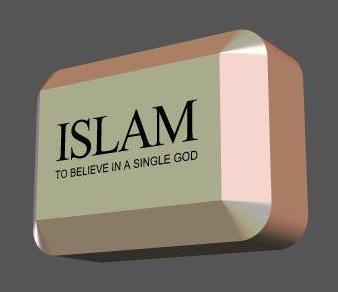
|
|
The following sites are good places to get an introduction about Islam: |
|
Islam and other religions:
Islamic doctrine maintains that Islam’s monotheism continues that of Judaism and Christianity. However, the Qur’an and Islamic traditions stress the distinctions between Islam and later forms of the two other monotheistic religions. According to Islamic belief, both Moses and Jesus, like others before them, were prophets commissioned by God to preach the essential and eternal message of Islam. The legal codes introduced by these two prophets, took different forms than the Qur’an, but according to Islamic understanding, at the level of doctrine they are the same teaching. The recipients of scriptures are called the people of the book or the "scriptured" people. Like the Jews and the Christians before them, the Muslims became scriptured when God revealed his word to them through a prophet: God revealed the Qur’an to the prophet Muhammad, commanding him to preach it to his people and later to all humanity.
Although Muslims believe that the original messages of Judaism and Christianity were given by God, they also believe that Jews and Christians eventually distorted them. The mission of Islam is protected by God, therefore, has been to restore what Muslims believe is the original monotheistic teaching and to supplant the older legal codes of the Hebrew and Christian traditions with a newer Islamic code of law that corresponds to the evolving conditions of human societies. Thus, for example, Islamic traditions maintain that Jesus was a prophet whose revealed book was the Christian New Testament, and that later Christians distorted the original scripture and inserted into it the claim that Jesus was the son of God.
According to Muslim belief, God sent Muhammad with the last and perfect legal code that balances the spiritual teachings with the law, and thus supplants the Jewish and Christian codes. According to the teachings of Islam, the Islamic code, called Sharia, is the final code, one that will continue to address the needs of humanity in its most developed stages, for all time. The Qur’an mentions 24 pre-Islamic prophets and messengers, and Islamic traditions maintain that God has sent tens of thousands of prophets to various peoples since the beginning of creation. Some of the Qur’anic prophets are known in the Hebrew Bible, but others are not.
For the Muslim then, Islamic history unfolds a divine scheme from the beginning of creation to the end of time. Creation itself is the realization of God's will in history. Human history is punctuated with prophets who guarantee that the world is never devoid of knowledge and proper worship of God. The sending of prophets is itself understood within Islam as an act of mercy. God, the creator and sustainer, never abandons his creations, always providing human beings with the guidance they need for their salvation in this world and a world to come after this one. God is just, and his justice requires informing people, through prophets, of how to act and what to believe before he holds them accountable for their actions and beliefs. However, once people receive the teachings of prophets and messengers, God's justice also means that he will punish those who do wrong or do not believe and will reward those who do right and do believe. Despite the primacy of justice as an essential attribute of God, Muslims believe that God’s most fundamental attribute is mercy.
* Take care from sources that are not trustworthy.
Contact us at wisamzaqoot@yahoo.com, if you have any questions or comments.